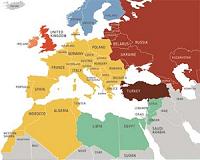| . |  |
. |
Berlin (UPI) Nov 18, 2010 The German government has beefed up security at airports and train stations after it was tipped that al-Qaida militants plan to strike targets in Germany at the end of this month. Police equipped with bulletproof vests, machine guns and sniffer dogs Thursday patrolled public hot spots all over Germany, including the major Munich and Berlin train stations as well as Frankfurt Airport, one of Europe's busiest air hubs. They were dispatched after Germany's Interior Minister Thomas de Maiziere on Wednesday had warned of an increased terror threat in the country. "According to intelligence received from a foreign partner an attack plan is to be carried out at the end of November," de Maiziere told a hastily convened news conference. The warning comes less than three weeks after authorities detected parcel bombs from Yemen on a plane in Dubai and on another jet that had landed in Germany and Britain. France and Britain have stepped up security since the United States in October warned of an increased threat from dozens of Europe-born al-Qaida insurgents who were trained in Pakistan and Afghanistan and have since returned to their home countries. U.S. drone attacks last month killed several insurgents, some of them born in Germany, but many militants are still at large. For the German government led by Chancellor Angela Merkel, Wednesday's explicit warning and the show of force on the streets represents a significant turnaround. Berlin has been very cautious not to issue overly alarmist security alerts, saying they would frighten but not protect the public. While de Maiziere didn't identify concrete targets, security officials have since said that train stations, airports and public gatherings such as Christmas markets, which are due to open in many German cities this weekend, are at special risk. "Al-Qaida is looking to strike symbolic targets," terror expert Rolf Tophoven said Thursday on German television, identifying major finance and political centers such as Frankfurt, Munich and Berlin as prime examples. On Thursday, it surfaced that police in Namibia intercepted a suspected suitcase bomb on an Air Berlin plane bound for Munich. Authorities said they couldn't yet confirm whether the device was an ignitable explosive. Berlin, a city of 4.3 million people, is another key concern for officials. Berliners often don't own a car and use the city's massive public transport system to get around. Fabian Frei, 30, shoulders a daily commute from his home in eastern Berlin to his work at a political think tank in western Berlin. Taking him several miles across the city, the trip involves stops at key transport hubs. "Of course I think about the terror warning but what should I do about it?" he asked this reporter. "I have to take the subway to get to work." An attack on Berlin would likely hit people from all over the world. The city's history-laden landmarks such as the Brandenburg Gate are in busy downtown areas that are bustling with tourists. Laura Tohtua, 22, a student from Finland spending several weeks in the German capital, said the terror warnings worry her. "It makes me feel a bit uneasy because I'm just discovering the city, so I'm in a lot of places where tourists hang out," she told United Press International as she was heading from the busy Friedrichstrasse train station to Museum Island, a tourist hot spot. While de Maiziere vowed Wednesday that people in Germany wouldn't be "intimated by terror, neither in our way of life, nor our culture or freedom," it was clear that Berliners were more suspicious than normal. German anti-terror police Thursday raced into the posh Charlottenburg district, where a suspicious suitcase was found in front of a large bank. The police closed off streets and evacuated buildings before detonating the suitcase. It turned out to be empty.
Share This Article With Planet Earth
Related Links The Long War - Doctrine and Application
 Rifts curb North Africa's war on Qaida
Rifts curb North Africa's war on Qaida Rabat, Morocco (UPI) Nov 17, 2010 As North African states grapple with al-Qaida in the Islamic Maghreb, old rivalries are undermining efforts to mount a concerted regional offensive against the increasingly active jihadists. In particular, the rift between Algeria, the region's military heavyweight which sees itself as the natural leader of North Africa, and Morocco is widening. Morocco, a longtime U.S. ally in t ... read more |
|
| The content herein, unless otherwise known to be public domain, are Copyright 1995-2010 - SpaceDaily. AFP and UPI Wire Stories are copyright Agence France-Presse and United Press International. ESA Portal Reports are copyright European Space Agency. All NASA sourced material is public domain. Additional copyrights may apply in whole or part to other bona fide parties. Advertising does not imply endorsement,agreement or approval of any opinions, statements or information provided by SpaceDaily on any Web page published or hosted by SpaceDaily. Privacy Statement |